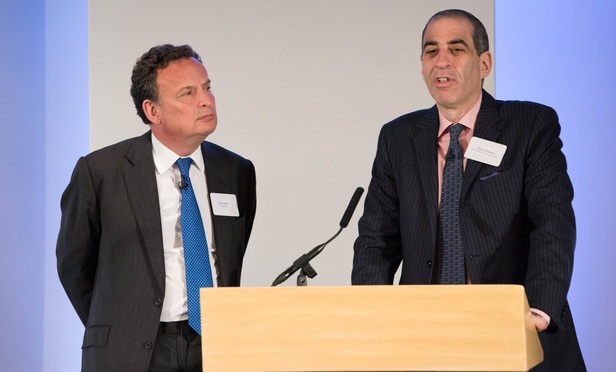'We don't regret the road not taken for a second' - Wachtell and Macfarlanes on why bigger isn't always better
From client demands to acquisitive rivals and alternative providers, Macfarlanes' Charles Martin and Wachtell's Adam Emmerich discuss the key challenges for independent law firms
April 12, 2018 at 06:14 AM
10 minute read
Wachtell Lipton Rosen & Katz M&A partner Adam Emmerich and Macfarlanes senior partner Charles Martin will chair Legal Week's Global Independent Law Firms Forum later this month. Here, they set out their thoughts on the challenges of staying independent in a globalising world and retaining the best talent in the face of mounting competition.
A host of speakers from leading firms and corporates will be at the event in London, with big names from organisations including Barclays, Harvard Law School, Travers Smith, Cravath Swaine & Moore, Slaughter and May, RPC, Corrs Chambers Westgarth and DLA Piper. For more information and to book your place, please click here.
What do you see as the biggest challenges facing independent law firms today?
Adam Emmerich: "I'm not sure I'd categorise Wachtell as independent – more highly specialised. The things we do, we modestly feel we're at the top of the game, but what we do is very specialised and focused. That's been a philosophy that's guided us from our earliest days and has differentiated us from other firms that may once have been similar to us but then chose the path of practice or geographic expansion.
"For us, it isn't about geography but about sticking to complicated, important M&A and 'bet the company' matters. To have imagined that we could colonise the globe and have anything like the depth of knowledge, experience and relationships that characterise our practice would have been grandiose. We don't regret the road not taken for a second."
How do you meet clients' demand for international coverage?
Emmerich: "We cultivate our relationships with other firms in other major centres. By striving to be the very best possible firm at what we do, we've become a member of a fraternity of independent firms with the same approach. We fully understand that the world has globalised, so having a coordinated effort is essential."
Charles Martin: "An important part of this is giving clients the feeling that they're still relying on their preferred counsel, and that they don't have to go to a firm with global offices to get that. The more sophisticated clients get, the more they're looking for specialist skills – this works for 'bet the firm' issues, but isn't right for everything a large corporation wants to do.
"If you take high-end M&A – it breaks down into very important sub-expertise and to have to build that everywhere would be a big challenge. We just need to have identified the right firms with those skills. "
How do you work with other firms on deals?
Emmerich: "Our strength is in very specific, important transactional and high-stakes assignments. If you assemble a group of firms to work on a bet-the-company project, then the success of the project depends on that team working together exceedingly well, as they are responsible both to the client and to each other as a source of future work. That can be incredibly uniting and powerful – being part of the same organisation doesn't necessarily result in more collaboration."
Are you concerned about the increasing buying power of ambitious, global firms like Latham & Watkins and Kirkland & Ellis?
Emmerich: "One of the biggest changes in the legal world has been the tremendous mobility of partners – people take a much more transactional approach to their career paths. One of the things that has made the global firms more formidable performers in M&A is their recruitment of top talent. It always comes down to the people, and that's why global firms have recruited so aggressively; the downside is that people who haven't grown up together may not form as cohesive and mutually supportive a team."
How do you keep your people away from these firms?
Martin: "It isn't just about the quality of the individual, but about how you empower them. Scale can make it harder to do that. You have to make the advantages real; you have to make sure that the advantages you offer in terms of quality of work, relative autonomy and compensation are sufficient to minimise the incentives to go elsewhere.
"We don't aspire to the levels of profitability of top New York firms. Partners need a good balance of compensation and an environment that offers real tangible benefits; not just in the present, but in the long term. There will always be someone out there that will pay you more today, but would it be more than we'd be paying you in five years' time?"
Do you have the same concerns at Wachtell?
Emmerich: "We're a pure, old-fashioned lockstep partnership – we're focused entirely on client-facing matters, where the interest of all of the partners is to do our utmost for our clients in very important situations. The relationships we develop, the situations we're involved in, create a job that's incredibly interesting, in an environment that's incredibly satisfying. The rest takes care of itself. We have a few core ideas; we hire the best people, work incredibly hard and care very much about what we're doing and getting the absolute best results possible for our clients. As it turns out, that makes for a fabulous job and a fabulous career."
 Do you think it's going to get more difficult to stay competitive in the face of increasing globalisation?
Do you think it's going to get more difficult to stay competitive in the face of increasing globalisation?
Martin: "Law is an incredibly simple business and the key is to keep it that way. No law firm has an entrenched right to exist; we have to earn that every month of every year. I'd say I have more cause for optimism now than 10 years ago. A number of things have evolved in ways that are beneficial to us. Technology means that independent firms can more easily produce work that is totally integrated – it could be the work of a single firm. Would that same drive to grow internationally that saw the explosion of the global firms in the last 25 years exist today with all of the technology that we now have?
How do you see your business adapting to change in the wider profession?
Emmerich: "You look at other sorts of service providers and the most adjacent would be investment banking: you have very globalised, mostly American financial institutions providing a range of financial services – mainly lending and M&A advice. Now you look at the ascendant entrants into that field, the boutique advisers; there's room for the two models to co-exist. Some people will be comforted by one-stop shopping, but others recognise the benefits of more specialist firms. Doing a lot more than we do would only result in us not being what we are.
Some low-cost providers have levelled the playing field – we can scale up very easily
"Bigger isn't always going to be better, even if bigger is somehow baked into human DNA. For Wachtell, we satisfy our ambitions by the quality of the work we do and the importance of the situations in which clients seek our advice. We're all practitioners, all on the front line, working on client problems and that's what we prize above all else – that's our competitive edge. Our view is that our sort of intensity and teamwork would be degraded by being part of a platform of thousands of lawyers. To be at the highest level you need a tremendous team effort and that's facilitated by all of us being in one office, working together and knowing each other well, while also having deep relations with other firms around the world.
Martin: "It isn't a soft option. In a way, growth is an easy choice. The one thing clients don't want to see is a small big firm. If you're going to be smaller, you need to offer something different in a smart way that offers tangible benefits to clients.
What impact are alternative legal providers having on your business?
Emmerich: "What we do isn't currently subject to disruption from those kinds of trends, but nothing is forever and who knows where we'll be in a decade or a century? At the moment, the large M&A market is not being disrupted. "
Martin: "We're pretty agile as independent firms. We need to make sure we can adapt and spot the opportunities that come from different types of competition. Some of these low-cost providers have levelled the playing field for us by delivering us access to a large team on demand. We can scale up very easily by using some of the alternative service providers. We've done some very large investigations that we wouldn't have been able to do before, by teaming up with external providers that have given us an ability to provide cost-effective resource quickly.
What about the accountants?
Martin: "They do some things really well and their depth and breadth of relationships among clients is huge, so you have to take that threat seriously. But there are aspects of what they do that clients don't like and, if you're agile, you can compete effectively and efficiently in those areas."
What impact will Brexit have on your business?
Martin: "I don't see any signs of clients demanding that we open more offices in Europe so far. You have to be very clear what you are – you pays your money and takes your choice."
Given your smaller size, is it harder for you to invest in technology and reap the economies of scale available there?
Emmerich: "Is there proprietary technology that anyone in the legal business currently has that offers a clear-cut competitive advantage? I don't see that in our practice. Widely adopted technology platforms, starting with document production and email, now with us for decades, and more recently the mobile connectivity revolution, have transformed work at the pit face for practising lawyers. And we can expect more of the same in the future, with AI, deep machine learning and the exploitation of big data, which are generally available to all firms.
"I'll be surprised if a law firm turns out to invent and develop something that transforms the practice or offers a proprietary competitive advantage, any more than a law firm would have invented, and retained for its exclusive use, the telephone or the iPhone. Technology is generally democratic and enabling, not the reverse."
What are your biggest concerns for the future?
Martin: "Attracting talent. You have to work very hard to make independence an asset – it can be seen as a liability. But look at the large, integrated banks and conglomerates and the successful challenges from advisory boutiques and disruptive brands. There are some disadvantages to scale. Firms that can demonstrate a slightly more focused, independent approach have got something that resonates pretty well with what many smart younger people are looking for today."
NOT FOR REPRINT
© 2025 ALM Global, LLC, All Rights Reserved. Request academic re-use from www.copyright.com. All other uses, submit a request to [email protected]. For more information visit Asset & Logo Licensing.
You Might Like
View All
Buzzwords, Bad Wine & Broken Social Contract: The Rise of Boring Legal Conferences

'We Shouldn't Expect this From Law Firms': Clients Discuss Workload in Aftermath of Pinsents Tragedy
3 minute read
Smiling Too Much? Why Some Lawyers' Partnership Ambitions 'Crash and Burn'

Legal Sector Must Learn to 'Fail Quickly' on Technology, Partners Say
Trending Stories
- 1Uber Files RICO Suit Against Plaintiff-Side Firms Alleging Fraudulent Injury Claims
- 2The Law Firm Disrupted: Scrutinizing the Elephant More Than the Mouse
- 3Inherent Diminished Value Damages Unavailable to 3rd-Party Claimants, Court Says
- 4Pa. Defense Firm Sued by Client Over Ex-Eagles Player's $43.5M Med Mal Win
- 5Losses Mount at Morris Manning, but Departing Ex-Chair Stays Bullish About His Old Firm's Future
Who Got The Work
J. Brugh Lower of Gibbons has entered an appearance for industrial equipment supplier Devco Corporation in a pending trademark infringement lawsuit. The suit, accusing the defendant of selling knock-off Graco products, was filed Dec. 18 in New Jersey District Court by Rivkin Radler on behalf of Graco Inc. and Graco Minnesota. The case, assigned to U.S. District Judge Zahid N. Quraishi, is 3:24-cv-11294, Graco Inc. et al v. Devco Corporation.
Who Got The Work
Rebecca Maller-Stein and Kent A. Yalowitz of Arnold & Porter Kaye Scholer have entered their appearances for Hanaco Venture Capital and its executives, Lior Prosor and David Frankel, in a pending securities lawsuit. The action, filed on Dec. 24 in New York Southern District Court by Zell, Aron & Co. on behalf of Goldeneye Advisors, accuses the defendants of negligently and fraudulently managing the plaintiff's $1 million investment. The case, assigned to U.S. District Judge Vernon S. Broderick, is 1:24-cv-09918, Goldeneye Advisors, LLC v. Hanaco Venture Capital, Ltd. et al.
Who Got The Work
Attorneys from A&O Shearman has stepped in as defense counsel for Toronto-Dominion Bank and other defendants in a pending securities class action. The suit, filed Dec. 11 in New York Southern District Court by Bleichmar Fonti & Auld, accuses the defendants of concealing the bank's 'pervasive' deficiencies in regards to its compliance with the Bank Secrecy Act and the quality of its anti-money laundering controls. The case, assigned to U.S. District Judge Arun Subramanian, is 1:24-cv-09445, Gonzalez v. The Toronto-Dominion Bank et al.
Who Got The Work
Crown Castle International, a Pennsylvania company providing shared communications infrastructure, has turned to Luke D. Wolf of Gordon Rees Scully Mansukhani to fend off a pending breach-of-contract lawsuit. The court action, filed Nov. 25 in Michigan Eastern District Court by Hooper Hathaway PC on behalf of The Town Residences LLC, accuses Crown Castle of failing to transfer approximately $30,000 in utility payments from T-Mobile in breach of a roof-top lease and assignment agreement. The case, assigned to U.S. District Judge Susan K. Declercq, is 2:24-cv-13131, The Town Residences LLC v. T-Mobile US, Inc. et al.
Who Got The Work
Wilfred P. Coronato and Daniel M. Schwartz of McCarter & English have stepped in as defense counsel to Electrolux Home Products Inc. in a pending product liability lawsuit. The court action, filed Nov. 26 in New York Eastern District Court by Poulos Lopiccolo PC and Nagel Rice LLP on behalf of David Stern, alleges that the defendant's refrigerators’ drawers and shelving repeatedly break and fall apart within months after purchase. The case, assigned to U.S. District Judge Joan M. Azrack, is 2:24-cv-08204, Stern v. Electrolux Home Products, Inc.
Featured Firms
Law Offices of Gary Martin Hays & Associates, P.C.
(470) 294-1674
Law Offices of Mark E. Salomone
(857) 444-6468
Smith & Hassler
(713) 739-1250









